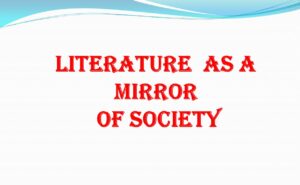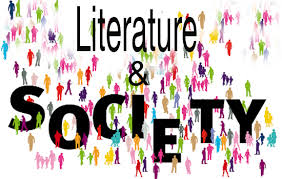Introduction
Literature and society have a strong and mutually reinforcing relationship that has persisted throughout history, with both influencing and reflecting the other. Literature is a potent tool for evoking a society’s spirit and conveying its ideals, challenges, and aspirations. In turn, societal advancements, cultural changes, and shared experiences inspire writers’ imaginations and inventiveness, resulting in the production of works that connect with readers everywhere in time and space.
Body
Literature as a Mirror of Society
The diverse sides of society are reflected in literature, which acts as a mirror. It depicts the social, political, and cultural realities of the era, giving insights into people’s attitudes, convictions, and life experiences. In order for readers to empathise with characters and develop a better knowledge of human nature, novels, plays, and poems frequently address important societal concerns including inequality, prejudice, and injustice. Harper Lee’s “To Kill a Mockingbird” and George Orwell’s “1984” are two classic works that have become touchstones for discussing social and political issues, demonstrating the ability of literature to illuminate society’s shadowier aspects.
Literature as a Catalyst for Change
By questioning accepted beliefs, challenging societal norms, and promoting fairness, literature can spark social change. Literature has always been an effective medium for social criticism and activity. Public opinion was shaped and social reform was promoted by authors like Jane Austen, whose works addressed gender roles and societal expectations, or Charles Dickens, who highlighted the plight of the working class during the Industrial Revolution. Even in modern times, writers like Chimamanda Ngozi Adichie and Ta-Nehisi Coates have utilised their writing to promote discussion and inspire action concerning racism, colonialism, and other structural injustices.
Literature as a Source of Empathy and Understanding
The potential of literature to foster empathy and close gaps between people from different origins is one of its outstanding qualities. Literature promotes empathy and understanding by immersing readers in the lives of characters who are different from themselves. It enables readers to confront biases and stereotypes by exposing them to various viewpoints, cultures, and historical situations. Increased social cohesiveness, tolerance, and a deeper understanding of the diversity of human experiences can result from this sympathetic participation. Jane Austen’s “Pride and Prejudice” and Khaled Hossein’s “The Kite Runner” are two examples of books that immerse readers in various settings while encouraging empathy and a feeling of our common humanity.
Literature as a Reflection of Cultural Identity
Literature is essential in creating and maintaining cultural identity. It ensures the continuity of a community’s traditions, rituals, and values over generations by capturing its essence. Literature acts as a repository of collective memory, whether it is through the legendary epics of ancient civilizations, the folktales and oral traditions passed down through the centuries, or contemporary works that explore the complexity of cultural legacy. It promotes diversity, resists assimilation, and strengthens cultural pride. Authors like Chinua Achebe, who wrote the book “Things Fall Apart,” and Gabriel Garcia Marquez, who wrote “One Hundred Years of Solitude,” have highlighted the vitality and intricacies of their individual cultures, shedding light on the importance of literature in upholding and sustaining cultural identity.
Literature as a Source of Inspiration and Imagination
Literature has a unique capacity to arouse people’s imaginations and inspire them. Authors explore the depths of human imagination through innovative narrative, which takes readers to fanciful worlds while pushing the limits of reality. Fantasy, science fiction, and magical realism literature, including J.R.R. Tolkien’s “The Lord of the Rings,” Ray Bradbury’s “Fahrenheit 451,” and Gabriel Garcia Marquez’s “One Hundred Years of Solitude,” not only capture readers, but also open readers’ minds to new possibilities. These fictional worlds frequently feature metaphors and allegories that make comments on current events and encourage readers to consider their own societies and consider alternate possibilities.
Literature as an Agent of Personal Transformation
Individuals can undergo personal transformations as a result of literature. Literature has the power to arouse strong emotions and promote introspection due to its emotional depth and relatable characters. A lot of readers have grown personally and had epiphanies through their interactions with literary works. Readers are strongly moved by tales of fortitude, atonement, and self-discovery like Harper Lee’s “To Kill a Mockingbird” or J.D. Salinger’s “The Catcher in the Rye,” which frequently prompt reflection and life-changing insights. Literature consoles, instructs, and challenges readers to consider their own values and views, forming their worldview and directing their behaviour.
Literature as a Medium for Cultural Critique
Literature has traditionally provided a forum for cultural criticism, giving authors the chance to question established hierarchies, highlight social injustices, and spark debate. Irony and allegory are used in satirical writings like George Orwell’s “Animal Farm” or Jonathan Swift’s “Gulliver’s Travels” to attack political structures and human foolishness. Literature encourages readers to consider the problems and contradictions in their own society by using humour, irony, and scathing social commentary. These works frequently act as discussion starters, sparking debates about vital topics and promoting social change.
Literature as a Catalyst for Dialogue and Understanding
Literature has the unique power to bridge cultural, social, and ideological gaps and promote communication and understanding. Literary works provide a platform for people to interact meaningfully, share a variety of viewpoints, and discover similarities despite differences. The places created by book clubs, literary events, and community reading initiatives allow readers of all racial, religious, and socioeconomic backgrounds to interact and debate literature. Literature improves social cohesiveness, fosters inclusivity, and fosters conversation through encouraging empathy and dialogue.
Conclusion
The impact of literature on society cannot be disputed. It reflects the triumphs, tribulations, and aspirations of society while also upending conventions, spurring change, and promoting understanding. Literature has a significant role in our culture because it may spark the imagination, reflect cultural identities, change people, and promote discussion. We can develop fresh viewpoints, broader views, and a deeper comprehension of the human condition through engaging with literature. Literature continues to be a crucial force that moulds our culture, promotes empathy, and ignites change in an increasingly interconnected globe. Let’s embrace literature’s transforming potential and acknowledge its significant influence on both our lives and the world we live in.





































